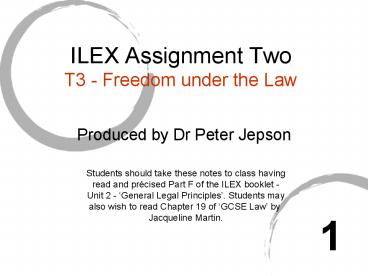ILEX Assignment Two T3 Freedom under the Law - PowerPoint PPT Presentation
1 / 11
Title:
ILEX Assignment Two T3 Freedom under the Law
Description:
Students should take these notes to class having. read and pr cised Part F ... Law: 'The Short Back and Side Bill [2006]' it gives free haircuts on the state ... – PowerPoint PPT presentation
Number of Views:74
Avg rating:3.0/5.0
Title: ILEX Assignment Two T3 Freedom under the Law
1
ILEX Assignment TwoT3 - Freedom under the Law
- Produced by Dr Peter Jepson
Students should take these notes to class
having read and précised Part F of the ILEX
booklet - Unit 2 - General Legal Principles.
Students may also wish to read Chapter 19 of
GCSE Law by Jacqueline Martin.
1
2
Lecture Rules
- Freedom of speech does not extend to chatting in
class. - So turn off your phone.
- Raise your hand if you have a question.
- You are free to take notes.
2
3
Golden Principle
- The Golden Principle of English Law is that we
can do what we like unless it is prohibited by
law. - So then - Who protects us against the state
limiting our freedoms?
3
4
Proposed new law
- I have a new Law The Short Back and Side Bill
2006 it gives free haircuts on the state by
the Scissors Police (it is intent on stopping
nit flew). - Does this deny human rights?
- Should a Judge - via a Judicial Review process -
be able to stop such a law?
4
5
Liberty
- Detention of an individual denies his freedom -
should it be allowed? - Do we have freedom of speech? (can I be racist,
sexist, defame someone?) - See the case of Tolstoy v UK 1995 - do you
agree with the outcome?
5
6
Freedom to protest
- The Public Order Act 1986 gives police the
power to impose conditions on public assemblies
where they consider there could be serious public
disorder, serious damage to property or serious
disruption to the life of the community. In such
circumstances they can - Dictate the venue of the meeting.
- Dictate its duration.
- Dictate the maximum number that can attend.
6
7
Freedom to march
- While the police cannot ban an assembly - they
can ban a march. - To hold a march/procession the POA 1986 written
notice must be given to the police giving the
date, time and route. - The Police can re-route and even blanket-ban
marches for up to 3 months - see Kent v Met
Police Comm 1981.
7
8
Raves
- Under the Criminal Justice and Public Order Act
1994 it is an offence to organise and/or attend
a rave after being ordered by Police to
disperse.
8
9
POA 1986 consequences
- If a meeting goes ahead and does not remain
peaceful a number of offences are possible. - Affray (s3) - unlawful violence towards another.
- Violent disorder (s2) - 3 or more persons
together use or threaten unlawful violence. - Riot (s1) - where 12 or more persons acting
together use or threaten unlawful violence.
9
10
ECHR
- Produce a list of a persons rights under the
ECHR. - Note that the ECHR only protects against an abuse
of rights by the state (or an arm of the state) -
it offers no protection against abuse by private
companies.
10
11
Task 3
- Do the Quiz at the back of this section in the
ILEX textbook. - Working with the person next to you plan a bullet
point answer to Task 3. - Be prepared to deliver your plan to the entire
class.
11































